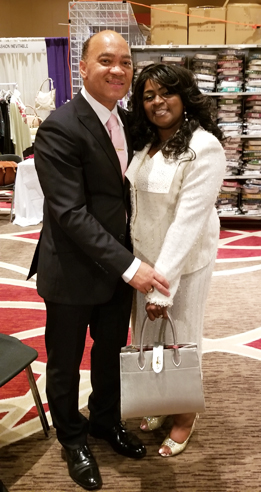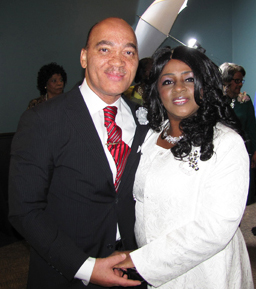
By Rev. Donald L. Perryman, Ph.D.
The Truth Contributor
Strong relationships are essential to [ministerial] success. It’s important to actively nurture and build these relationships, as they can see you through.
– Stanley Meytin
For centuries, the Black Church has used the Servant Leadership model to deliver spiritual and social transformation to its members and others experiencing economic, social or personal trauma. But unfortunately, these empathetic but busy and (often bi-vocational) clergy leaders often place others’ needs at the forefront of their priorities while ignoring their own needs and health.
In addition, putting the interest of others before self-interest can create a culture of dependency and over-reliance on the leader among those served rather than build community and empowerment.
Without an effective self-care regimen, clergy face such risks as the Superman or Superwoman Syndrome, seeing themselves as able to do it all. It is also easy for leaders to think that nothing will get done without them. In addition, clergy often suffer from Vicarious Trauma, where leaders exposed to traumatic situations become overwhelmed and develop some of the same symptoms as those they minister to.
The Rev. Cedric Brock has led the historic Mount Nebo Baptist Church for 28 years. Brock also shepherds the 60-church Interdenominational Ministerial Alliance (IMA) and works full-time as ombudsman for Toledo Public Schools. I spoke in-depth with Pastor Cedric and First Lady Debra Brock about navigating the deep waters of their ministerial calling and how to bring balance between life’s priorities and Black Church leadership.
Perryman: What are the significant stress issues facing a pastor of an African-American church today?
Brock: First, the commitment of the membership. It’s also a challenge dealing with the deaths and turnover. I’d say that we only have maybe four people left from when I first got here.
Perryman: How does today’s generation differ from the previous one?
Brock: The old church would give you the shirt off their backs. We’re dealing with a whole different generation and being patient with them. There are a lot of youth, but they’re very transient, and their parents are frequently moving around. They may have eight different cell numbers in a year, so we’re trying to keep up with them. So, it’s important to transition into the new era of social media and understand the church must no longer be just a paper outlet.
Perryman: First Lady, what are some issues of stress for you?

First Lady: For me, some of the issues of stress are probably more personal. My issues are probably my husband’s responsibility for so many things. As he said, a lot of the younger people are not yet groomed to accept the job’s responsibilities. So many jobs, the older ones used to see a need, go in and just handle it. So, I get a little concerned more about him because he’s overextending himself at times.
Perryman: As a bi-vocational pastor, you have to work during the day, prepare sermons, do Bible study, and perform funerals and weddings. How does such a large workload affect you?
First Lady: I think it doesn’t affect me now because we’ve been married for some time. But, there were times there were places I wanted to go or things I wanted to do like every other average couple. So, therefore, I had to be unselfish, knowing that’s his job, so I dare not interfere with kingdom work. So, the only thing I can do is suggest that he pull back at times because you see when it’s going too far as a wife.
Perryman: Can you elaborate?
First Lady: Now that my daughter is older, it’s not as hard. But her growing up, I had to explain things to her. She did not see her dad as much as many of her friends would. I had to explain that he has a dual role. First, he has a secular role, and then his church role.
Whereas often, I’d just tell him, ‘Maybe you need to take a little time off or stay home for a bit and then go and do something later.’ So, being able to take time to maintain our household.
Brock: I have slowed down quite a bit. I don’t do as much as I used to because I think we have won a couple of gains when it comes to accomplishments for the little I do. In the past, I would do a lot and make a little, but now I can do less and make more, if that makes sense, because of the experience that you bring to the table.
Perryman: If the workload and changes in the church bring stress issues, have they affected your marriage?
First Lady: I’ve been blessed to have my mother as a good role model, as well as having her now give us both excellent advice. She provides me with information on how to talk, when to talk and when not to speak, and my role as a First Lady. So, where my strengths are concerned, that’s what I hold onto. My mother has taught me to know that I’m God’s child and to walk with my head up high and don’t let them see me sweat and don’t let them see me talk negatively about my husband.
I think that’s been most beneficial even with our marriage. On the flip side of that, growing up, I had a home life, too, with my father being a pastor. So, that allowed me to see how my parents could balance kids, marriage, finances and still entertain us growing up. My daddy stressed the importance of vacations. So, we really were blessed to have people that instilled that wisdom, and more importantly, we listened to them.
Perryman: The reason I asked is that pastors, seemingly more than anyone, are asked to give and give and give. Often, we do so much for the congregation and others that we neglect our own home, marriage, or children.
Brock: Well, let me put it like this: if I’m going to put some money into the church and do something at the church, I better go home and do something. I’ve learned to do that. Time has taught me that. It’s funny you say that because you just have to know that I know Debra will tell me if I mess up. That’s why I appreciate her. She’ll let me know, and it ain’t up for debate. You have to have some balance, so there are moments that I really have to slow it down and say, ‘I better be careful, I better be cool, I’m doing too much, I gotta pull back.’
Perryman: Is there anything specific that you two do to keep your marriage fresh or nurture your marriage?
Brock: We make sure we do go on vacation. We spend Friday nights going to dinner. I try to buy my wife flowers, to remind her how special she is. Though that’s a question, if we were in a counseling session, the counselor would say, ‘Cedric, you gotta improve that.’ So that’s something that we do need to do.
Perryman: What do you say, First Lady?

First Lady: It’s very challenging. I would like to have more of his time, and I know there are some things that he and I can improve on, and we need to make that commitment. We do little things. We watch a movie together at home, which is important, and we make sure that we eat dinner together every night. I don’t care how busy we are; we both call each other and say, ‘Are you on your way home? I’ll wait till you get here.’ So we try to do that and watch something off the TV that can be a little thought-provoking and give our ideas and stuff like that, But, as I said, there is always room for improvement.
Perryman: Have you ever felt like quitting pastoring?
Brock: It’s the church, you give of yourself so much, and there are moments that you say, ‘man, I can’t take this no more.’ Not as much as I used to, I do have to say that. But there was a time during my first 10 years I wanted to quit. Every Sunday, I didn’t want to go down there. To the membership, I was just a little boy. I was young, my wife was young, and they’d continue reminding me of that, so I had to keep focused on my assignment. Sometimes I want to quit now because we got control of it, but now I wish I had the old congregation back so they can tell me what to do. No, that’s just something that you go through. But now, I know, understand, and appreciate the blessings of taking care of God’s business.
Perryman: When you feel like quitting now or get emotionally down, how do you deal with that directly?
First Lady: Luckily, I’ve been blessed to have my mom and sisters. My sisters and I are extremely close, and I can turn to them. I’m kind of to myself a lot. So, I don’t have workplace friends or anything like that. And, relationships at the church, I kind of keep those – I keep the church separate.
Brock: It’s stressful, Pastor, but as you know, that’s life, and you just keep moving and don’t let it get too close to you. You can’t wear it to bed. So don’t take it home, but leave it at the 9-5. However, they’re calling you at 10:00 at night. So, you still must know when to cut it off.
Perryman: Thank you both!
Contact Rev. Donald Perryman, PhD at drdlperryman@centerofhopebaptist.org

